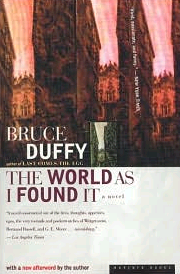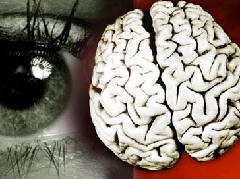You are currently browsing the daily archive for December 20, 2007.
45. These days, nothing is easier than for a woman to be sexy, since so much of it is about. Money-making belongs here, too, along with every graduate with a degree who can only reproduce, but never create.
44. It is often said that for a marriage to work, husband and wife must share more in common than mere species membership. Now, if you and I share the same environment day in, day out, it helps tremendously if in our spontaneous behavior we think and act alike. Because the truth of the matter is this: marriage is hard enough as it is, and seldom fares well when through lack of spontaneity from the domestic level on up, every little thought and deed needs to be explained and accounted for. That is a dreadful burden! Spontaneously from the bottom-up; or – bottoms-up!

From the New York Times by Perry Meisel
When the wealthy and cultivated young Ludwig Wittgenstein burst upon the hermetic world of Bertrand Russell and G. E. Moore at Cambridge in 1912, three lives were changed forever. The Viennese Wittgenstein struck even Russell as perhaps more than his match. The unflappable Moore shared in a fierce but collegial relation that survived two world wars. As a combatant in the Austrian Army late in World War I, Wittgenstein completed the only book he saw fit to publish during his lifetime, ”Tractatus Logico-Philosophicus” (1921). Returning to Cambridge in 1929, he began to question his own assumption in the ”Tractatus” that the study of language could yield systematic rules, preferring instead to delight in the indeterminacies of linguistic reference, and composing, among other works, ”Philosophical Investigations,” published in 1953, two years after his death.
So alluring is Wittgenstein’s appeal that it has stirred Bruce Duffy, a writer who lives in suburban Washington, to produce a historical novel centered on Wittgenstein and his English friends. Its sweeping arrangement of fact and fancy is vivid, passionate and funny. Mr. Duffy adheres faithfully enough to the outlines of Wittgenstein’s life as we know them (a full-scale biography has yet to be completed), although his book is really an accomplished orchestration of the spheres of Russell’s urbanity, Moore’s domesticity and Wittgenstein’s wanderlust that is organized around three key points in Wittgenstein’s experience -his first years at Cambridge, his service in World War I and his return to England.
Mr. Duffy intersperses his absorbing narrative with deft flashbacks that fill in the pasts of all three men (the death of Wittgenstein’s father in Vienna is probably the novel’s most extraordinary sequence). He writes with great wisdom about love, work and fame, painting raucously humorous and uncommonly moving portraits of his three principals. Russell stews deliciously in his inwardness; Moore gobbles his meals at high table at Trinity with such methodical relish that his philosophical hedonism is explained more convincingly than it is in most academic accounts.
The rendering of Wittgenstein is more dramatic and less naturally inward, testimony to his daunting intractability as both a man and a thinker. Wittgenstein’s melancholy narcissism was so profound that it frequently turned into its opposite – the feeling that he hardly existed at all. In reply to a friend’s request to take his photograph, Wittgenstein remarks: ”You may develop your film & find no image whatsoever.”
The novel’s title comes from a passage in the ”Tractatus” (”If I wrote a book called The World As I Found It, I should have to include a report on my body”) that concludes with the difficult statement that such a book would be ”a method of isolating the subject, or rather of showing that in an important sense there is no subject.” Mr. Duffy exemplifies Wittgenstein’s point both by apprehending him within a matrix of social contexts, and by dramatizing the elusiveness of subjectivity in the dream of a world he fashions with a prose that aspires to a combination of visionary expansiveness and postmodern terseness.
There are, to be sure, a few hitches. Bertrand Russell did not, pace Mr. Duffy, split infinitives. Nor did Lytton Strachey have a booming voice – it squeaked. There are also some lapses into melodrama – a visit to a Yiddish theater in Vienna, a family friend-turned-Nazi and Wittgenstein’s painful acknowledgment of his Jewish roots at the onset of World War II. Such moments aside, Mr. Duffy’s is an achievement in both fiction and historiography which deepens Wittgenstein’s mythology and should attract a wider audience to it.

From CBS News, December 19, 2007
Your genes may affect your ability to remember faces and places, new research shows. The key findings:
– People are better at remembering faces and places than objects or made-up words.
– People’s skill at recalling faces and places may be influenced by their genes.
That news comes from a study of identical twins (who have identical genes) and fraternal twins (who aren’t genetically identical). Each twin watched a series of faces, places (houses), objects (chairs), and pronounceable nonsense words (such as “banrat”) flash onto a computer screen. They pressed a computer key if they saw the same image pop up twice. Meanwhile, their brains were scanned using functional magnetic resonance imaging (fMRI).The brain scans showed that during the test, brain activity patterns were more similar among identical twins than fraternal twins when the twins recalled faces and places, but not objects or made-up words.
“Genetics do play a crucial role” in remembering faces and places, write the University of Michigan’s Thad Polk, Ph.D., and colleagues. Evolution may have carved the ability to recognize faces and places into the genes, Polk’s team suggests in The Journal of Neuroscience.
From the Guardian Unlimited, December 19, 2007
Michael Foucault said that “anyone who thinks rationally is suspect”. It is quite possible that he first had this thought (for, despite everything, that is what it is) in a Parisian cafe lit by electricity, while drinking a cup of hot coffee and nibbling on a baguette, unconscious or (worse) dismissive of the contrast between these outcomes of human rationality – light, coffee, bread – and this bit of poseur philosophy. He was a supporter of the Ayatollah Khomeini and the Iranian revolution, almost exclusively because it was a revolution (what fun) and certainly because he had no conception of what the Ayatollah’s revolution was intended to effect: the medievalisation of Iran under the reactionary and oppressive thumb of clerics. (And the wrong medievalism: there was a quite different medieval Persia with irreverent poets and atheist philosophers, with science and music, with beautiful figurative art and exquisite porcelains).
Would the forgoing entitle someone to conclude that I think the shah’s regime was just dandy, and that Foucault had nothing interesting to say about the control of truth by power? If the dispiriting figures on literacy published by the US department of education are a guide, and if they more rather than less reflect the situation in the western world at large, the answer would be affirmative though wrong. A survey showed that “reading proficiency” as indicated, for instance, by the ability to “compare viewpoints in two editorials” is possessed by only 13% of the US adult population. By extension one might think that the ability to take things on their individual merits, which means being able, for example, to agree with some things and criticise other things in Foucault, is a minority skill.
The same applies to valuing the intellectual skills associated with literacy while also being able to value, as one should, the different and in many ways saner, more down to earth, more rational intellects of illiterate people, as exemplified by the Central Asian peasants to whom Aleksandr Luria talked in the 1930s. He showed them the kind of pictures used in IQ tests, of groups of objects one of which is an odd-one-out: in one, a hammer, saw, axe, and log of wood; in another, three adults and a boy. The peasants refused to see the log or the boy as odd ones out in the pictures. Anyone who rejected the log of wood, said one peasant, was either a fool or had plenty of firewood already. The boy was necessary because the three adults would require him to run and fetch things as they worked. Theirs, in short, was a more inclusive rationality. It reminds one that the word “sophisticated” started life as a pejorative.
But the fact is that illiteracy is a luxury that the contemporary world can no longer afford. The world is too complex and various for its residents to be ill-informed, and therefore more likely to be prejudiced and incapable of distinguishing differences and connecting comparables; and even worse if they are unable to concentrate long enough to grasp a cornerpoint or acquire all the data needed to make a sound judgment. Almost everyone is capable of all this if given the opportunity and the right encouragement; if the quoted statistics are right, it must be that most are not given enough of either. After the horrendous debacle of the first world war some of the best minds of the era concluded that education of the young was vital to save the future: all three of Bertrand Russell, Ludwig Wittgenstein and Karl Popper became schoolteachers for a time in the 1920s in an effort to make that difference. Of course they soon realised that they could make better contributions by working to the grain of their real aptitudes, which turned out not to be (and, so to say, by a long chalk) primary school teaching. But the idea was right: education is the key: not only of children, but of everyone at all ages (come to Birkbeck!) all through life.
Education is the key, but not the panacea; Foucault was an educated man, if not indeed over-educated; and like most of the over-educated (no exceptions implied) capable of sometimes being a fool as a result. So there are no guarantees that education, and the literacy that lies at its core, will people the earth with angels. But it would make things better, because knowledge reduces fear, and the fear born of ignorance is a chief cause of conflict.


Recent Comments